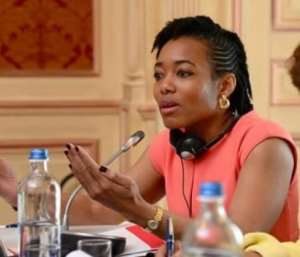
Dr Zanetor Rawlings, Member of Parliament for Klottey Korle Constituency, has urged young women to strive to discover themselves, if they are to make a difference in the world of politics.
She said one lesson that politics and public life often taught people was the importance of knowing your status and stability, which will help you to face the challenges that often came with stepping into the political territory.
She was speaking at an event to mark International Women's Day 2018, organised by the Canadian High Commission, in collaboration with the Australian and British High Commissions, in Accra.
It was on the theme: 'Women in Politics - Pressing for Progress in Ghana'.
Dr Rawlings urged young women to be authentic, saying be 'as who you are; to be able to stand in your power and say this is who I am, to be able to declare these are the values that I believe, this is what I live by.
'And not be afraid to do so, is what helps us to push the boundaries, helps us to make the changes that we see that society needs'.
She said young people, 'especially women, venturing into politics will face resistance, as there were people who were satisfied with the status quo.'
Dr Rawlings said Ghanaian culture acknowledged the value of women as can be seen in the role that the Queen Mother plays, which Ghanaians should take advantage of.
She however noted that, going into politics as a woman was sometimes harder, than it was for men, particularly due to the issues that people chose to raise regarding a woman's eligibility to run for any office.
'You often wonder if every man was judged by the same standards that women are judged; no man would be in politics today,' she said, adding that, every society needed the balance of men and women to actually develop in a sustainable fashion.
She also stressed the need for increased sensitization for all involved to understand the value of pressing for progress.
Mrs Elizabeth Ohene, a veteran broadcaster and former Minister of State, recounted the challenges that she faced growing up as a girl and her entry into Journalism and politics as a woman.
'My view is that I have been in politics all my life, and I will stay in politics all my life' she said, noting that, her decision to run for Parliament had brought the realisation that things had not changed for women in Ghana since her childhood.
She noted however, the gains made so far, with the top three best performers in the West African Senior Secondary Certificate Examination (WASSCE) being Ghanaian girls, and also the challenges that still persisted, such as a reported 36 per cent of 19 year-old females in Ghana, being mothers.
Ms. Heather Cameron, Canadian High Commissioner to Ghana, who hosted the event, said Canada believed that advancing gender equality and the empowerment of women and girls was the most effective way to eliminate poverty, create peace, achieve sustainable development and inclusive societies.
'We believe fully in women's political participation as influencers, as decision makers and as leaders, and that, this participation is a key driver to advancing gender equality in Ghana,' she said, adding that, while there had been mush progress, there was still more to be done.
GNA
By Belinda Ayamgha, GNA




 No need to tax churches – Bawumia
No need to tax churches – Bawumia
 Voter registration: NPP rebukes NDC over request for serial numbers of BVR kits
Voter registration: NPP rebukes NDC over request for serial numbers of BVR kits
 Parliament to summon VRA for failing to dredge Volta estuary for years
Parliament to summon VRA for failing to dredge Volta estuary for years
 Stop the desires for coup d'état — Ghanaians told
Stop the desires for coup d'état — Ghanaians told
 Manhyia Palace bans Tricycle riders on Sunday to climaxes Otumfuo's 25th anniver...
Manhyia Palace bans Tricycle riders on Sunday to climaxes Otumfuo's 25th anniver...
 Blame Supreme Court for limited voter registration challenges – George Opare Add...
Blame Supreme Court for limited voter registration challenges – George Opare Add...
 Excessive partisanship breeds madness — Prof Gyampo on NPP’s defence of cedi dep...
Excessive partisanship breeds madness — Prof Gyampo on NPP’s defence of cedi dep...
 PDS scandal: ‘The totality of Ghana’s loss is the ‘dumor’ being experienced toda...
PDS scandal: ‘The totality of Ghana’s loss is the ‘dumor’ being experienced toda...
 677,140 births and 50,992 deaths recorded in 2022 - Statistical Report
677,140 births and 50,992 deaths recorded in 2022 - Statistical Report
 Ghana’s electoral commission is one that trusts thieves — Omane Boamah
Ghana’s electoral commission is one that trusts thieves — Omane Boamah
